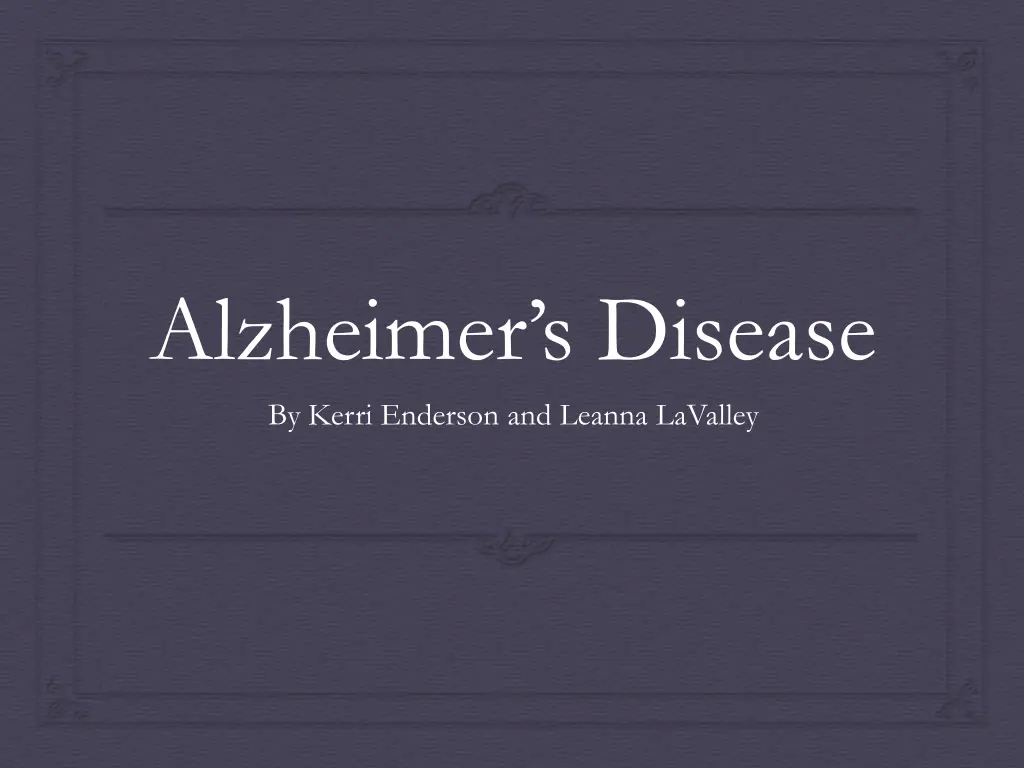
Understanding Alzheimer's Disease: Causes, Symptoms, and Treatment
Alzheimer's disease is a neurodegenerative disorder that leads to memory loss and cognitive decline. Learn about the causes, symptoms, and treatment options available for this progressive illness affecting millions of people, particularly those aged 65 and older.
Download Presentation

Please find below an Image/Link to download the presentation.
The content on the website is provided AS IS for your information and personal use only. It may not be sold, licensed, or shared on other websites without obtaining consent from the author. If you encounter any issues during the download, it is possible that the publisher has removed the file from their server.
You are allowed to download the files provided on this website for personal or commercial use, subject to the condition that they are used lawfully. All files are the property of their respective owners.
The content on the website is provided AS IS for your information and personal use only. It may not be sold, licensed, or shared on other websites without obtaining consent from the author.
E N D
Presentation Transcript
Alzheimers Disease By Kerri Enderson and Leanna LaValley
What is Alzheimers? Alzheimer's disease is a neurological disorder in which the death of brain cells causes memory loss and cognitive decline. A neurodegenerative type of dementia, the disease starts mild and gets progressively worse Alzheimer's is a progressive disease Most common in people who are age 65 or older
Fun Facts Alzheimer's disease is the most common type of dementia. The term dementia describes a loss of mental ability associated with gradual death of brain cells There are an estimated 5.3 million Americans of all ages with Alzheimer's disease. An estimated 5.1 million people are age 65 and older, and approximately 200,000 individuals are under the age of 65. Every 67 seconds someone in the US develops the disease. MacGill, 2016
Fun Facts Continued It is the only cause of death in the US top 10 that cannot be prevented, cured or slowed. Almost 2/3 of Americans with Alzheimer's disease are women. 1 in 3 seniors dies with Alzheimer's or another dementia. Alzheimer's and other dementias cost the nation $226 billion per year. Due to the physical and emotional toll of caregiving, Alzheimer's and dementia caregivers had $9.7 billion in additional health care costs of their own in 2014. As the population of the United States ages, Alzheimer's is becoming a more common cause of death. MacGill, 2016
Causes Plaques and tangles found between the dying cells in the brain Cells are dying due to the build up of a protein called Beta-amyloid Tangles are from a breakdown of a protein called Tau.
Treatment There is no cure for Alzheimer s, only medications to slow the progression or to treat the symptoms of the disease Medications for memory loss include Cholinesterase inhibitors such as Aricept, Exelon, Namenda (Memantine) and Razadyne. These medications prevent the breakdown of Acetylcholine, a neurotransmitter that influences learning and memory, and delays the worsening of existing symptoms
Treatment Continued Treatments for behavior include antidepressants for mood (i.e. Prozac, Zoloft) , anxiolytics for anxiety and/or restlessness (i.e. Ativan), and antipsychotic medications for hallucinations (i.e. Abilify, Haldol) Along with medications to treat symptoms, it is recommended to help the person suffering from Alzheimer s by monitoring their comfort, avoiding confrontation, redirecting their attention, creating a calm environment, allowing them to rest, providing them with a security object, and listening to their requests.
The Future of Treatment Currently, there are only five drugs approved by the FDA to treat symptoms of Alzheimer s; however, they only treat the symptoms and not the causes of Alzheimer s Research is being done to find ways to continue to slow the progression of Alzheimer s and to hopefully find a cure or a way to treat the underlying causes, rather than just the symptoms. There are many clinical trials being done to further examine if new medications could work to treat Alzheimer s disease
The Future of Treatment Continued Testing for Early Detection Brain imaging (i.e. fMRI) Cerebrospinal fluid (CSF) proteins Genetic profiling Existing mild cognitive impairment
The Future of Treatment Continued Prevention Heart health Physical exercise Diet Social connections Cognitive activity Head trauma
References MacGill, M. (2016, March 21). "Alzheimer's Disease: Causes, Symptoms and Treatments." Medical News Today. Retrieved fromhttp://www.medicalnewstoday.com/articles/159442.php. Alzheimer's Disease & Dementia | Alzheimer's Association. (n.d.). Retrieved April 12, 2016, from http://www.alz.org/alzheimers_disease_what_is_alzheimers.asp
